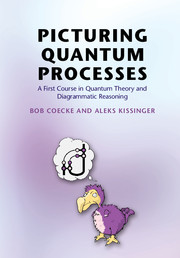Book contents
- Frontmatter
- Contents
- Preface
- 1 Introduction
- 2 Guide to Reading This Textbook
- 3 Processes as Diagrams
- 4 String Diagrams
- 5 Hilbert Space from Diagrams
- 6 Quantum Processes
- 7 Quantum Measurement
- 8 Picturing Classical-Quantum Processes
- 9 Picturing Phases and Complementarity
- 10 Quantum Theory: The Full Picture
- 11 Quantum Foundations
- 12 Quantum Computation
- 13 Quantum Resources
- 14 Quantomatic
- Appendix Some Notations
- References
- Index
7 - Quantum Measurement
Published online by Cambridge University Press: 30 March 2017
- Frontmatter
- Contents
- Preface
- 1 Introduction
- 2 Guide to Reading This Textbook
- 3 Processes as Diagrams
- 4 String Diagrams
- 5 Hilbert Space from Diagrams
- 6 Quantum Processes
- 7 Quantum Measurement
- 8 Picturing Classical-Quantum Processes
- 9 Picturing Phases and Complementarity
- 10 Quantum Theory: The Full Picture
- 11 Quantum Foundations
- 12 Quantum Computation
- 13 Quantum Resources
- 14 Quantomatic
- Appendix Some Notations
- References
- Index
Summary
A new scientific truth does not triumph by convincing its opponents and making them see the light, but rather because its opponents eventually die, and a new generation grows up that is familiar with it.
– Max Planck, 1936The only way quantum theory allows us to interact with quantum systems is via quantum processes. Thus, the only way we can extract information about the state of a quantum system is to apply some non-deterministic process and observe which of the branches happened. For that reason, many people refer to the act of applying certain quantum processes as measurement and sometimes even as observation. A consequence of this unfortunate terminology is that one of the most touted ‘strange’ features of quantum theory is often misleadingly described as follows: ‘The mere act of observing a quantum state changes it.’
‘Misleading’, since the concept of measurement described in the previous paragraph is far from the passive concept of observation familiar from our macroscopic world, but is rather a non-trivial process that will almost always drastically affect the quantum state. So, the mysterious aspect of quantum theory is not that ‘observation’ alters the quantum state but, rather, that it is impossible, even in principle, to ‘observe’ a quantum system in the classical sense.
Given this fundamental restriction on how we can extract information from a quantum system, what can we learn about that system by means of a quantum process? The answer is, in fact, very little! First, performing a particular measurement could, for the vast majority of quantum states, yield any outcome i with a non-zero probability. In that case, obtaining an outcome i doesn't tell us much about what the state of the system was. Second, we say ‘was’, because the measurement will moreover irreversibly change the state according to the outcome. So rather than revealing the state of a system, a quantum measurement typically erases that state from history!
Nonetheless, these quantum measurements are crucial to quantum theory since they constitute the only interface between us, in our classical world, and the quantum world. The great insight of the quantum computing community is that the non-deterministic changes induced by these quantum measurements are not a nuisance, but rather an extremely useful resource.
- Type
- Chapter
- Information
- Picturing Quantum ProcessesA First Course in Quantum Theory and Diagrammatic Reasoning, pp. 345 - 404Publisher: Cambridge University PressPrint publication year: 2017



